How A North Korean Defector Sends Money Back Home
It may seem like North and South Korea are completely cut off from each other, but even after decades of separation, channels of communication persist. Defectors who have made it to freedom are bridging the gap, connecting people inside North Korea to the world beyond. Through extensive broker networks, they send back money and information, accelerating change in the world’s most authoritarian country.
Through this process known as remittances, millions of dollars are sent into the country every year, representing huge spending power. Here’s how they do it!
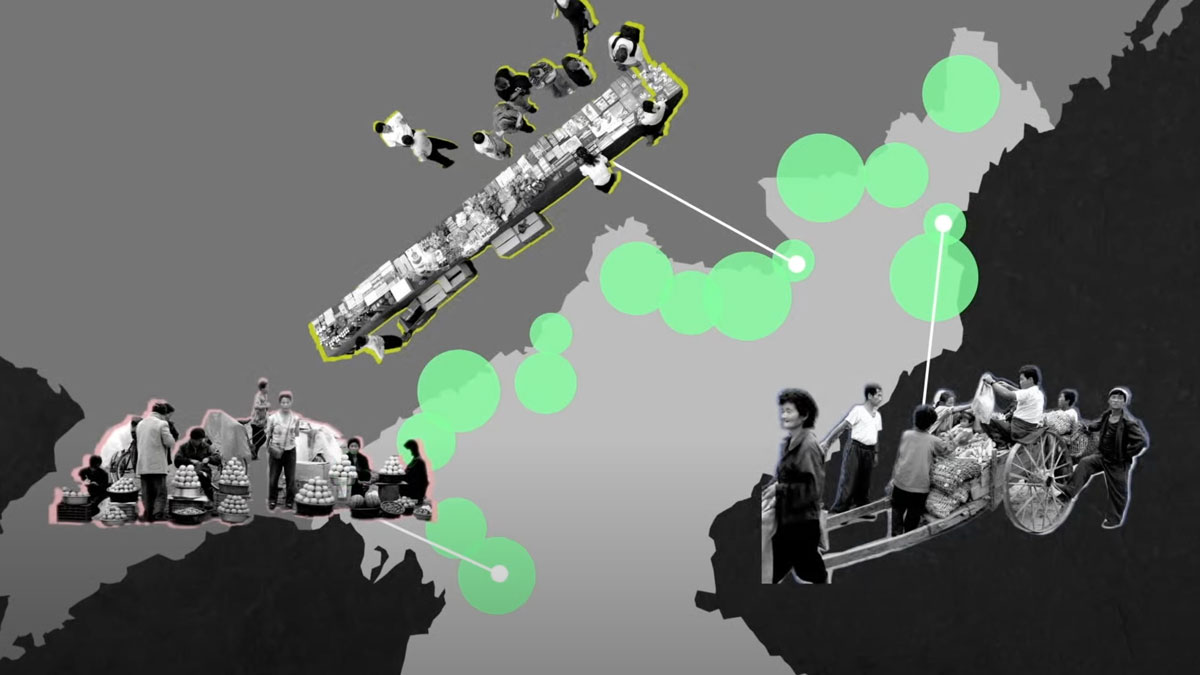
Reconnecting with Family
To send money back home, North Korean refugees must first contact their families. They hire brokers to find their relatives and arrange illicit phone calls close to the border with China, where smuggled Chinese cell phones can connect to international networks. In North Korea, people are often wary of such brokers, so they may have to be convinced with codewords or childhood nicknames that only the family would know, or recognizable handwriting and photos.
To avoid being caught, contact is often made from the mountain at night, or using a series of text or voice messages sent through apps like Wechat and quickly deleted. When the call finally happens, it can be emotional for both sides.
“You hear someone say, ‘Okay you’re connected, you can speak now.’ But no one says anything to each other. You just hear a high-pitched tone, and silence. Could this be real? You’re just crying, and can’t even speak.”
– Miso, escaped North Korea in 2010
How Remittances Work
There are different ways to send money to North Korea, but a simple version involves three parties: A North Korean resettled in South Korea, a remittance broker in North Korea, and the recipient in North Korea.
- A resettled North Korean, makes a request to a remittance broker to arrange a transfer. They wire money to a Chinese account controlled by that broker.
- The remittance broker in North Korea uses a smuggled Chinese phone to confirm receipt of the funds.
- After taking a hefty commission, they give cash to the refugee’s family. The family can confirm receipt of the money by sending a photo, video, or voice message back, so the sender can be confident that they’ve not been scammed.
With this process, the remittance broker in North Korea occasionally needs to replenish their cash on hand. This could happen through the physical smuggling of cash, but oftentimes money from their Chinese bank account is used to buy goods in China that are then sold in North Korea, generating cash. In this way, physical money never actually has to cross borders.
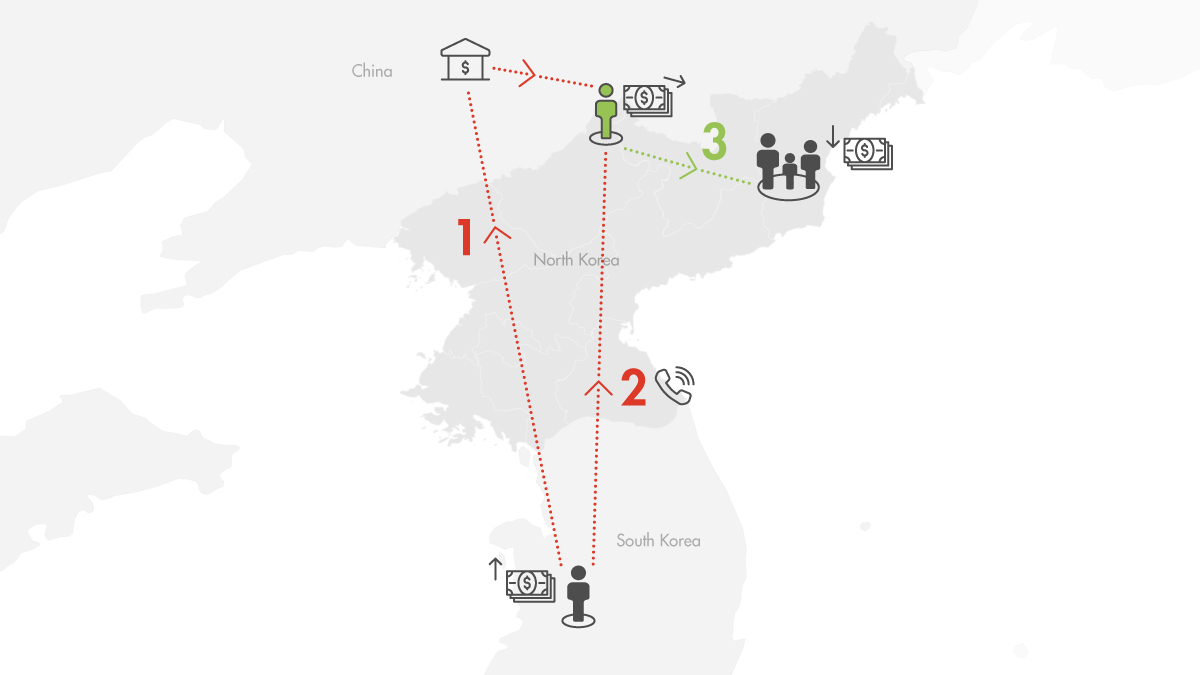
The Power to Change Lives
North Korea is one of the poorest countries in the world, whereas South Korea is one of the richest. Therefore remittances from relatives in South Korea or elsewhere can be absolutely transformative. The money is spent on almost everything, including food, clothing, shoes, medicine, housing, transport, and bribes to keep the family safe.
“I’ve sent money back to North Korea ever since I resettled in South Korea. I send an average of $1,500 a year. My parents used the money to buy a house! They’re also going to use it to help my younger brother escape and come to South Korea.”
– Jeonghyuk, resettled North Korean refugee
With new resources also comes new opportunities. North Koreans who never had the means before can now think about starting a business at the Jangmadang, or market. Since the collapse of the regime’s socialist economy in the 1990s, the markets have become essential to making a living. The flow of remittances is increasing trade, food security, marketization, and entrepreneurship, empowering ordinary North Koreans to gain autonomy.
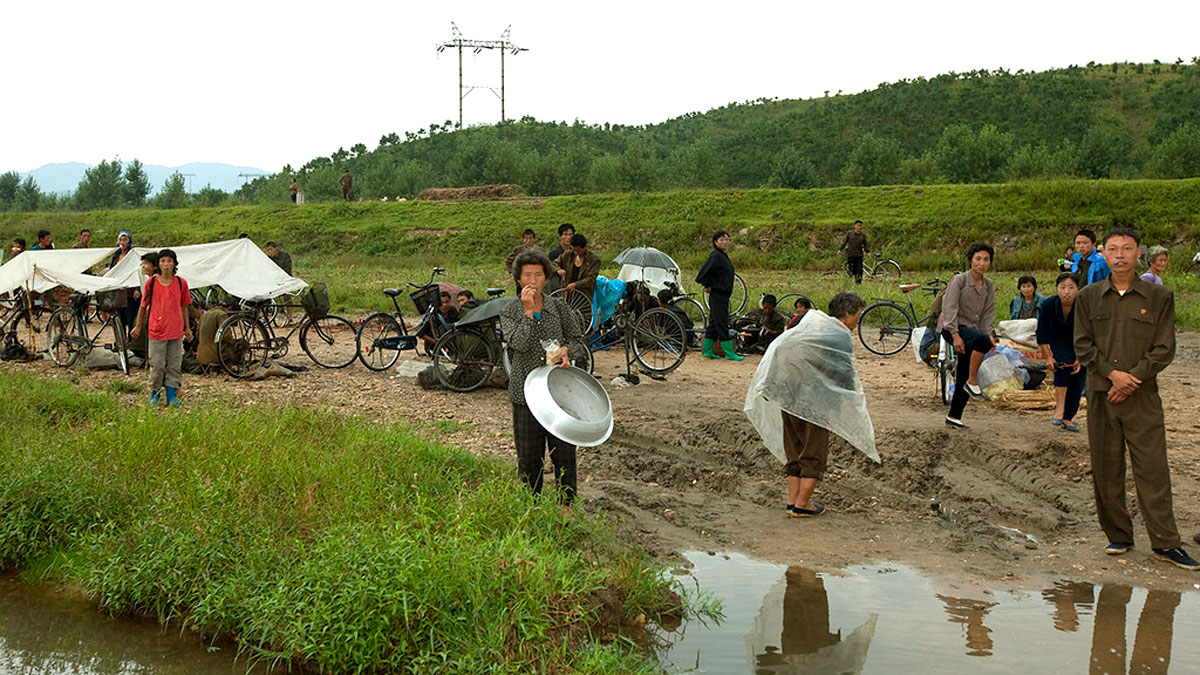
A Ripple Effect
Along with money, North Korean refugees send back news and information from the outside world. At first, family members back home may not want to hear about life beyond the border. Decades of propaganda villainizing the outside world can be difficult to overcome, and if caught in communication with defectors, they could face serious punishment.
But as money continues to flow in, many people can’t help but be curious- what do their relatives outside do to make a living? What kind of house do they live in? Is life there like the K-dramas smuggled into North Korea? Conversely, defectors ask their family members, what they can do with the money in North Korea? This exchange of information is incredibly valuable, providing a glimpse into the most closed society on earth.
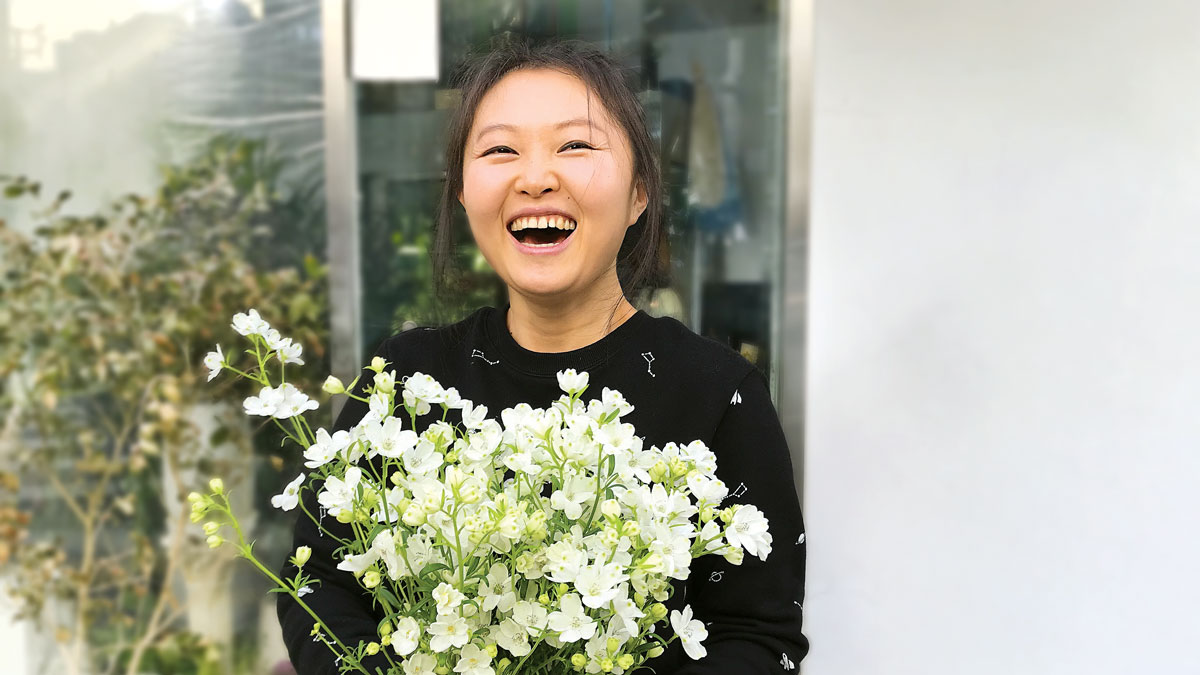
The flow of information into North Korea erodes the regime’s propaganda and changes worldviews. As the people learn more about the wealth and opportunities of the outside world, some may also risk their lives to escape. Money sent from remittances can also be used to fund this dangerous journey.
“When I first contacted my family back in North Korea after I resettled in South Korea, they didn’t believe that I was doing well here. My parents even resented me a little for leaving. But after I sent them money and told them more about my life here, their views changed. Now they realize that the regime has been lying to them and they’re not as loyal anymore. I have become a pioneer of freedom to my family back in North Korea.”
– Jo Eun, rescued by LiNK in 2017
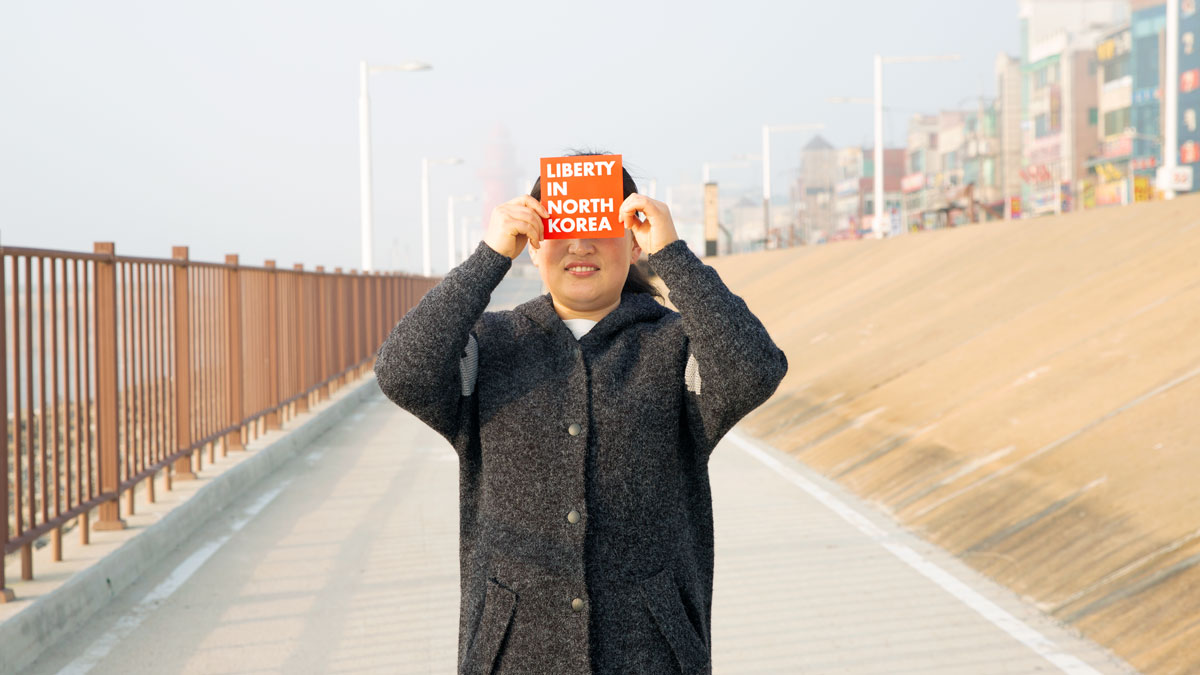
Agents of Change
Remittances are about more than just the movement of money. Refugees who have been separated from their families aren’t able to go back home themselves, but can still care for their loved ones in some way. Every phone call into the country and every dollar sent back represents one small step towards the day when the North Korean people finally achieve their freedom.
More than 33,000 North Korean refugees have made it to freedom, and although it has become more difficult during the pandemic, surveys report that 65.7% have sent money back to North Korea. At LiNK, we’re committed to working with and building the capacity of North Korean refugees so they can succeed in their new lives and make an even bigger impact in their communities and on this issue.
At the Forefront of North Korean Human Rights Work | LiNK Organizational Update
Liberty in North Korea welcomes Sarah Yun as our new Chief Regional Officer (CRO), South Korea, as our previous South Korea Country Director, Sokeel Park, transitions into a new role as our Chief Strategy Officer (CSO). Sarah and Sokeel will collaboratively lead LiNK’s South Korea operations while growing LiNK’s impact through their respective areas of expertise.
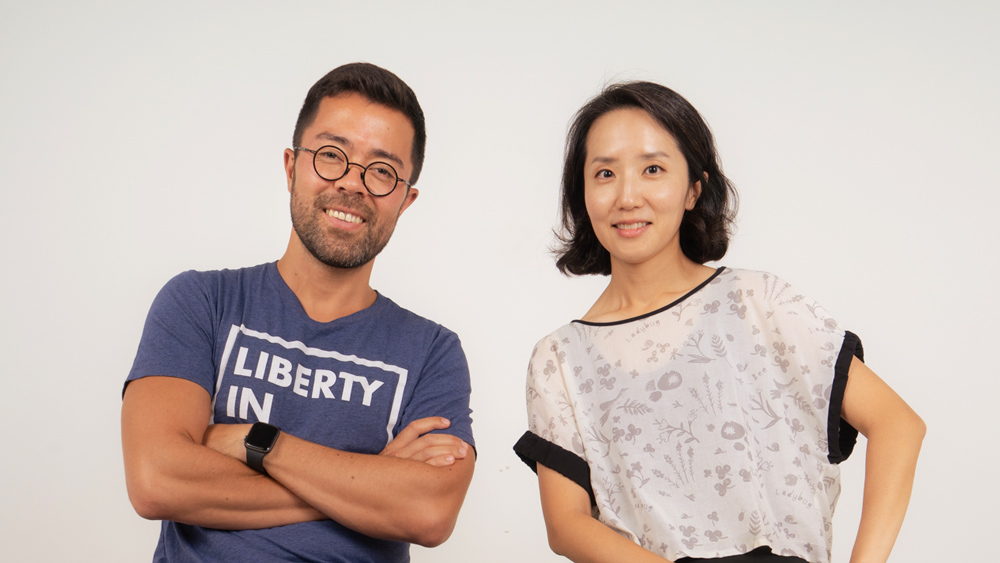
Over a Decade of Dedication to Human Rights
Sarah Yun brings a wealth of experience and expertise from her work to advance human rights in North Korea and across Asia during the past 15 years. She most recently served as the Country Director of Korea and Cambodia at the National Democratic Institute (NDI), managing the Institute’s operations and programs in the two countries.
Previously, Sarah was a Senior Manager for Asia at the National Endowment for Democracy (NED), overseeing the Cambodia, Vietnam, North Korea, Thailand, and the Philippines programs and teams. Prior to her experience at the NED, she worked at the Center for International Private Enterprise where she managed the Cambodia and North Korea programs, in addition to the Papua New Guinea program and field office.
“I have had the opportunity to work on issues related to various countries in Asia at a variety of institutions throughout my career, but my greatest passion has always been to envision a North Korea where its people can choose their own future. I am deeply inspired by the stories and resilience of the North Korean people and am committed to supporting their leadership and efforts toward a better future.”
– Sarah Yun, LiNK CRO
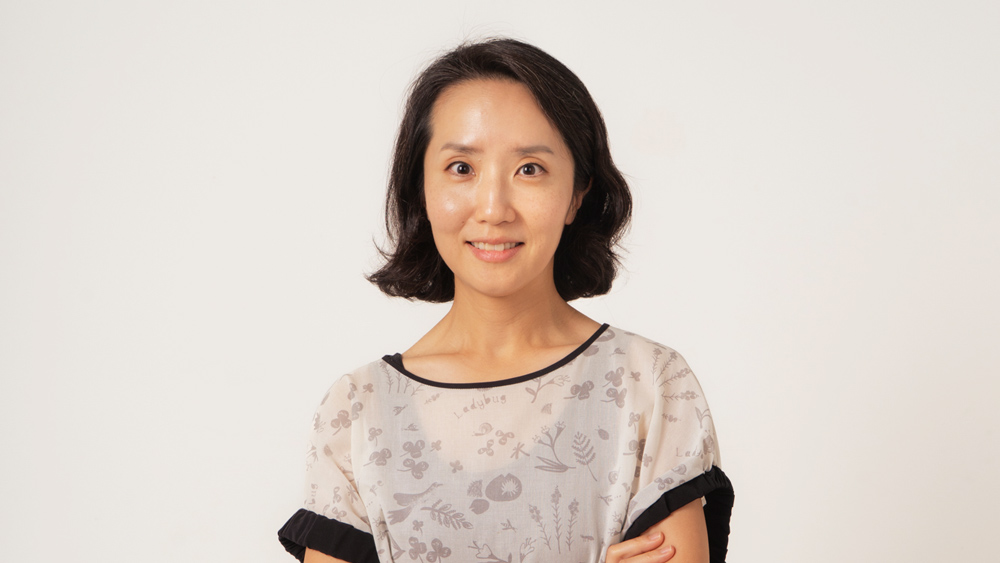
Sarah holds a BA in Political Science and Business Institutions from Northwestern University and MA in International Relations and International Economics from Johns Hopkins University School of Advanced International Studies. Her journey with LiNK began in college, when she came across her campus LiNK Team.
“I first learned about LiNK during my college years, when chapters began to emerge across the United States. Since then, I have respected the organization’s mission and work. When I was given the opportunity to work at LiNK, I had great anticipation and excitement at the thought of joining and supporting North Koreans' journey toward a free and open future. Together with the LiNK team, I hope to contribute to amplifying the leadership and voices of young North Korean defectors in creative and impactful ways.”
– Sarah Yun, LiNK CRO
A Strategic Shift
As LiNK continues to expand and refocus our programs in response to the evolving needs of this issue, there was a timely opportunity to bring on Sarah and diversify the organization’s impact.
As CRO, Sarah Yun will lead LiNK’s South Korea team, oversee our Capacity Building Programs, and represent the organization in South Korea. Sokeel Park will jointly represent LiNK alongside Sarah and maintain key collaborative efforts with external stakeholders. As CSO, Sokeel’s scope will also encompass the development of the organization’s broader strategy and Information Access Programs (IAP). Moving forward, IAP is an area of work which we are expanding as a crucial way to support North Koreans driving change inside the country, and achieve our vision.
North Korean refugees consistently tell us that getting more outside information into North Korea is crucial for empowering North Koreans to change their country. The importance of this area of work has only increased in recent years, so it is vital that we are able to increase the resources and time we are investing into these strategies. I’m extremely grateful to our donors for joining with us and making this expansion and these initiatives possible.”
– Sokeel Park, LiNK CSO
This is a challenging time for North Korean people, refugees, and the issue. We are grateful to Sarah for bringing her experience and expertise to LiNK and everyone whose support sustains our organization and enables us to grow.
We look forward to increasing our impact with Sarah’s leadership and sharing updates about our progress with our supporters.




